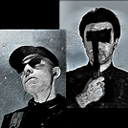Russian industrial noise: Pioneers, youth league and party members
February 20th, 2002 by olkor received Comments Off on Russian industrial noise: Pioneers, youth league and party members.
I. Lebedev-Frontov
Artist and musician Alexander Lebedev-Frontov is one of the central figures of the extremist noise scene in St. Petersburg. There is an aura of almost dostoyevskian underground around Lebedev-Frontov; he says that he has “quite a negative attitude towards information about our releases, because it is always a reduction.” He started doing his noise collages in 1979 at the age of 19, but didn’t release anything or perform live until the early 90’s. He mentions in passing that he had lead “quite a monastic way of life” until then, and if seen in the St. Petersburg street crowd, you would probably guess that he is, with his non-subcultural beard and ultra-normal couture, a volunteer in some restoration project of an Orthodox church on the outskirts of the city… read it is more
II. Avia
AVIA’s live performances were particularly impressive: the band, which consisted of five to seven musicians, always performed with a group of young girls doing “bio-mechanic” gymnastics and forming human pyramids in the totalitarian style of the 1920’s and 1930’s. All wore similar factory-worker overalls and the stage was decorated with red-black-and-white quasi-constructivist symbols. The music could be descibed as a cross between Soviet “industrial marches” of the 30’s and Devo: mindless choruses, fast, driving rhythms and simple, fanfare-like melodies. Their concept was quite similar to Laibach, but arguably more accessible and fascinating both visually and musically. (At that point the USSR was still information-isolated, and AVIA’s musicians claimed that they only heard about Laibach when they were able to tour abroad after 1987)… read it is more
III. Borisov
Alexei Borisov was the frontman of another exotic fruit of perestroika, Notchnoi prospekt from Moscow. Like many Soviet bands of the late 80’s, they didn’t care much about stylistic incongruities of their music, which makes it difficult to define their genre. In any case, often they sounded a lot like Western “industrial rock” (Controlled Bleeding of the same period, Clock DVA of the early 80’s…), or vice versa. On recordings their songs suddenly collapsed into strange arhythmic breakdowns, and into lengthy, repetitive and noisy improvisations on stage. What made the band exceptional were Borisov’s lyrics and vocals. Somewhat in the spirit of the the Russian 1930’s novelist Andrei Platonov, who has been called among other things the Soviet Kafka, they describe mundane situations and objects in absurd detail, while somewhere in the background looms an apocalyptic vision such as an environmental catastrophy or mindless, totalitarian masses taking onto streets… read it is more
IV. Kuryokhin
For a few years after perestroika it was still possible to organize festivals of experimental-minded musics, release records and have media exposure through old structures, which were in one way or another sponsored by state money. Quite soon, however, both the audiences and the new sponsors – advertisers – began to lose their interest in this culture. On a larger scale it looked like the much-awaited free market benefited only the very few, and democracy post-Soviet style seemed just as pointless, especially after the spectacular and bloody artillery bombardment of Russia’s parliament by Boris Yeltsin in 1993. In any case, at the same time as a more “capitalist” pop/media/advertising industry began to emerge in Russia, many avantgarde musicians among other cultural workers started to sympathize with the criticists of the status quo, of which the most attractive ones turned out to be extreme radicals like the National Bolshevik Party, who call themselves “Naz-Bol’s”… read it is more
V. Zga
The sound of ZGA’s improv noise is like a metaphor of the late Soviet or post-Soviet everyday life: rusty, broken-down, unpleasantly dominated by cold metal, functioning to seemingly inpenetrable, absurd logic. ZGA is the first still active Russian noise group, started in 1984. Nick Sudnick, its sole remaining member from the original line-up, is another of those dozens of St. Petersburg musicians who at some point played also in Pop Mechanics. I meet him in his workshop in the center of St. Petersburg… read it is more
* Note: This article was edited for length when published in The Wire. Here you have read the original unedited version.Tags: . Zharikov, Anton Nikkilä, electro, electronic music, experimental music, F.R.U.I.T.S, Kuryokhin, Lebedev-Frontov, MIDI drums, musique concrete, noise music, noise scene, Notchnoi Prospekt, performances, Pop Mechanics, power electronics, Russian industrial, Russian underground, Soviet electronics, Yegor Letov, Zga, Борисов
Posted under: Shum Info in other languages / Шум Инфо не по-русски . . . . . . . . . . . . . . . . . . . . . . . . . . . . . . . . . . . . . . . . . . . . Друзья! Мы представляем новый блог об электронной, экспериментальной, нестандартной музыке России и всего мира. Алексей Борисов/Олег Корнев. . . . . . . . . . . . . . . . . . . . . . . . . . . . . . . . . . . . . . . . . . . . . . . . . . . . . . . . . . . . . . . . . . . . . . . . . . . . . . . . . . . . . . . . . . . . . . . . . . . . . . . . . . . . . . . . . . . . . . . . . . . . . . . . . Dear friends! This is our new blog of electronic, experimental and unusual music from Russia and other countries.
Alexei Borisov/Oleg Kornev. . . . . . . . . . . .
. . . . . . . . . . . . . . . . . . . . . . . . . . . . . . . . . . . . . . . . . . . . Друзья! Мы представляем новый блог об электронной, экспериментальной, нестандартной музыке России и всего мира. Алексей Борисов/Олег Корнев. . . . . . . . . . . . . . . . . . . . . . . . . . . . . . . . . . . . . . . . . . . . . . . . . . . . . . . . . . . . . . . . . . . . . . . . . . . . . . . . . . . . . . . . . . . . . . . . . . . . . . . . . . . . . . . . . . . . . . . . . . . . . . . . . Dear friends! This is our new blog of electronic, experimental and unusual music from Russia and other countries.
Alexei Borisov/Oleg Kornev. . . . . . . . . . . .





